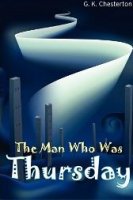 The Man Who Was Thursday: A Nightmare by G. K. Chesterton (original copyright 1908)
The Man Who Was Thursday: A Nightmare by G. K. Chesterton (original copyright 1908)
We should have more such nightmares. Wikipedia refers to The Man Who Was Thursday as a "metaphysical thriller," and I suppose that's as close as possible to giving it a label. Like Chesterton's Manalive, this tale of anarchy and adventure is a wild ride, but it is shot through with goodness—not to mention Chesterton's characteristic mental gymnastics and wordplay.
It's hard to imagine that Garth Nix, author of the Keys to the Kingdom series, owes no debt to The Man Who Was Thursday in his use of the days of the week. At least, having recently read the series on the recommendation of my grandson, it was obvious to me, especially since Nix throws in innumerable other literary references. Equally obvious, and more signficant (because closer in intent and feeling), is the influence of the clothing in the final chapter on the gowns worn at the end of C. S. Lewis's That Hideous Strength.
Such is the nature of The Man Who Was Thursday that I can confidently quote a large section from near the end without fear of giving anything away:
"You! " he cried. "You never hated because you never lived. I know what you are all of you, from first to last—you are the people in power! You are the police—the great fat, smiling men in blue and buttons! You are the Law, and you have never been broken. But is there a free soul alive that does not long to break you, only because you have never been broken? We in revolt talk all kind of nonsense doubtless about this crime or that crime of the Government. It is all folly! The only crime of the Government is that it governs. The unpardonable sin of the supreme power is that it is supreme. I do not curse you for being cruel. I do not curse you (though I might) for being kind. I curse you for being safe! You sit in your chairs of stone, and have never come down from them. You are the seven angels of heaven, and you have had no troubles. Oh, I could forgive you everything, you that rule all mankind, if I could feel for once that you had suffered for one hour a real agony such as I—"
Syme sprang to his feet, shaking from head to foot.
"I see everything," he cried, "everything that there is. Why does each thing on the earth war against each other thing? Why does each small thing in the world have to fight against the world itself? Why does a fly have to fight the whole universe? Why does a dandelion have to fight the whole universe? For the same reason that I had to be alone in the dreadful Council of the Days. So that each thing that obeys law may have the glory and isolation of the anarchist. So that each man fighting for order may be as brave and good a man as the dynamiter. So that the real lie of Satan may be flung back in the face of this blasphemer, so that by tears and torture we may earn the right to say to this man, 'You lie!' No agonies can be too great to buy the right to say to this accuser, 'We also have suffered.'"
 I hate using sunscreen. It's sticky, it stinks, and if I get the water-resistant kind—what other is of any use?—I can't get it off my hands. I try to avoid using it myself, and am, shall we say, less than generous when asked by someone else to "do my back." As in "You want me to do what? Can I walk across hot coals instead? Please?"
I hate using sunscreen. It's sticky, it stinks, and if I get the water-resistant kind—what other is of any use?—I can't get it off my hands. I try to avoid using it myself, and am, shall we say, less than generous when asked by someone else to "do my back." As in "You want me to do what? Can I walk across hot coals instead? Please?"
Our trip to Hawaii may have changed my mind. Advised by friends who had been there to invest in some SPF 50 sunscreen, we picked up some Ocean Potion. I'd never heard of it, but it appeared to be the best choice. I think so! It turned out to have the most pleasant scent I've encountered in a sunscreen, and though it was water-resistant, did not feel oily, sticky, or any other kind of icky. I found I didn't mind at all donning it for our beach or crater-crossing days. Well, to be completely honest, I didn't mind as much. But it was a great improvement.
I've been hoarding the remainder, assuming it was a brand local to Hawii, which was the only place I'd seen it. But recent research has revealed that it is now available here, at Wal-Mart of all places. Considering that Ocean Potion is made in nearby Cocoa, Florida, you'd think I would have run into it somewhere before. Perhaps I had, but didn't "see" it because I didn't recognize the brand. They also have an SPF30 version, which I plan to try out for latitudes more northern than Hawaii.
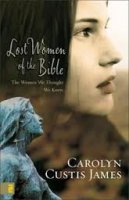
Lost Women of the Bible: Finding Strength and Significance through Their Stories by Carolyn Custis James (Zondervan, 2005)
The Gospel of Ruth: Loving God Enough to Break the Rules by Carolyn Custis James (Zondervan, 2008)
In mid-September of 2001, a friend pulled me through one of the most tumultuous times of my life. (No, we weren't in New York City on September 11, but I was home alone, with movers packing up my earthly possessions, and scheduled to fly—yes, fly—to Boston in few days.) This friend also gave me Carolyn Custis James' newly-published book, When Life and Beliefs Collide. I need to read it again: I'm pretty sure it was a good book, but as I said, life was a bit unsettled for me and I don't remember it. Moreover, I was put off by the same problem that prevented me for more than a decade from seeking out James' subsequent books: what I perceived at the time as a falsely positive reference to some very negative events in the life of our church.
So I'm a slow learner. Judgements made on small evidence are useless at best. My only defense for avoiding James' books is that the list of good books to read is always heartbreakingly longer than the time available to read them, anyway. Reading these two books is part of an effort to recover the locust-eaten years.
On the surface, these books would appear to be primarily for women; that judgement, also, would be a great mistake. I can't say better than to quote J.I. Packer's comment about When Life and Beliefs Collide: "Her book seems to me to be a must-read for Christian women and a you'd-better-read for Christian men, for it gets right so much that others have simply missed." I would add, however, that the adjective "Christian" is neither necessary nor helpful in the case of these two books, as most non-Christians would also have their conceptions of women and the Bible blown away by James' analysis.
Although both of these books tell great stories, their purpose is less narrative than theological and exegetical. Therefore it is necessary to know something of James' abilities in these areas. Since I'm not qualified to judge, I'll quote a few endorsements by people who are:
I have not read (nor, I expect, have you) a more discerning, humbling, thought-provoking, God-honoring, life-enhancing treatment of Ruth than this one. It makes outstandingly fruitful study for believers of all ages and both genders. (J.I. Packer, Professor of Theology, Regent College)
Men and women will benefit from reading Carolyn James's engagingly written book. In Lost Women of the Bible, she brings new insight to the biblical text and rightly expands our idea of what makes a woman godly. I enthusiastically recommend this book. (Tremper Longman III, Professor of Biblical Studies, Westmont College)
Carolyn Custis James gives the church a precious spiritual gift: How ten unsung heroines of the Bible shaped and expanded the kingdom of God and continue to bolster the faith of the church. Her penetrating and unforgettable biographies of these risk-taking biblical heroines are built on solid exegesis and a deft use of rhetorical criticism—though she never uses the term, seeing truths in the text that only a woman can see. Her engaging style with lightning bolt sentences demonstrates the valuable resource God has given the church in her gifted daughters to minister in words and deeds. This book explicitly challenges women of every social stratum to become the culture makers God intended them to be. (Bruce Waltke, Professor of Old Testament, Reformed Theological Seminary)
So what do you think of Eve? Carolyn James compares her with her own grandmother at the end of her life:
The vibrant woman I remembered—the woman God created her to be—was lost somewhere in a fallen, aging body that was no longer hospitable to her marvelous spirit.
The last time anyone saw Eve, she was only a shell of her former self too, a broken-down version of the woman God created her to be. The original Eve was lost in Paradise. Sadly, instead of remembering her in those earlier glory days, the world's memory of her was frozen in time at the worst possible moment—back in the Garden of Eden just as she swallowed a piece of forbidden fruit and served some to her husband. ... We wouldn't dream of doing to my grandmother what we persist in doing to Eve. We forget what Eve was like in her prime and try to reconstruct her legacy from the broken remnants that remained of her at the end.
James also turns the tables on our customary views of Noah's wife, Sarah, Hagar, Tamar, Hannah, Esther, Mary the mother of Jesus, and Mary Magdalene (reserving Ruth and Naomi for their own book). It was the story of Tamar—the "bad girl" of the Bible, who played the part of a prostitute in order to seduce, and be impregnated by, her father-in-law—that took my breath away. Read Lost Women of the Bible, and learn how a more careful analysis of the text and an understanding of her culture reveal Tamar as a righteous woman who rescued both the patriarch Judah and the human line of Christ.
Tamar shatters the traditional definition of what it means to be a woman by standing up to the most powerful man in her life. ... [S]he takes the symbols of authority away from the man who tells her whom to marry and where to live—a man who can sentence her to death without answering to anyone. Before returning the articles ... she pointed Judah back to the God of the covenant, the only true authority over both of their lives. ... Judah gave Tamar the highest marks for her conduct and accepted her righteous rebuke. ... Her actions didn't emasculate or feminize him, as we are warned will happen if a woman takes the initiative. She didn't rob Judah of his manhood. To the contrary, he became a better man because of his encounter with her. One wonders what would have become of Judah if Tamar had held her peace and remained passive. The strength of a woman is a powerful weapon for rescue, healing, and peace when women like Tamar are "strong in the Lord."
The biblical Book of Ruth is often presented as a sweet romance, but the intense suffering and the questioning of God's goodness are more like the Book of Job than a love story. And the heroic, other-centered, self-sacrificial actions of the three main characters—Naomi, Ruth, and Boaz—are an Old Testament prefiguring of the gospel in action.
Here are just a few more of the many quotes I could have pulled:
It's obvious to anyone who has experienced a significant loss that the sorrows of this world and the wounds they inflict in our souls cannot be compensated no matter how much good fortune and prosperity come our way. Many holocaust survivors ended up wealthy, raised beautiful families, and enjoyed the good things in life. But they never stopped hurting or felt their sufferings had evened out. That's just not how life works. To suggest that everything balanced out in the end for Naomi is to trivialize both her sufferings and also what God is trying to teach us through her story.
Naomi is completely unaware that the whole world is counting on the baby she cradles in her arms [grandfather of King David, and an ancestor of Christ] for the fulfillment of God's promises to redeem his people and put to right this fallen world. Obed will not be the last boy born in Bethlehem to hold such a strategic place in the world's history. Imagine the enormous responsibility of raising such a child. You would want the wise men from the east to come. Summon the teachers of the law, the priests, the rabbis. God chose Naomi to be Obed's teacher. And she is ready for the job, for Naomi has gained wisdom in the school of suffering.
A rescue effort is underway. Lives are at risk. There's a kingdom to build. A planet to reclaim. God doesn't intend to do any of this without us. He burdens our hearts. He opens our eyes to see faces, needs, and possibilities. He is counting on his daughters to live and proclaim his gospel. Whether we're tucking a child into bed; ministering to a friend; pursuing a heart that is hardened to the gospel; working in the corporate world, the church, and the community; or fighting for justice in some remote region of the earth—God is advancing his kingdom through our efforts and our gifts.. And you never know when some small everyday battle you are fighting may turn the tide for the kingdom in a big way.
I highly recommend both Lost Women of the Bible and The Gospel of Ruth. Those who know me will understand more of how impressed I am with these books, because they know
- As my previous reviews show, I'm decidedly unimpressed by both the content and the writing of much contemporary Christian literature. (I use that final word loosely.) Carolyn Custis James is a serious researcher, a clear thinker, and a good writer.
- I've complained in previous reviews of authors who speculate about the conversations, thoughts, and emotions of the characters in biblical narratives. A lot of that must happen in order to flesh out the Bible's spare descriptions of these women's lives, but here I don't mind it. All I can say in my defense is that these speculations seem natural, believable, and fitting to the text, rather than awkwardly imposing modern thought on a distant culture.
- One feature common to many contemporary Christian books is a "discussion questions" section at the end of each chapter. I loathe this. I always have, at least since its first appearance in my school textbooks. Both of these books have that unpleasant feature (which I literally overlook), and yet I still love them.
Next up? Steeling myself to reread When Life and Beliefs Collide (my mind knows I'll enjoy it; my gut still has issues), and requesting that our library add to its collection Carolyn Custis James' latest book, Half the Church, written to complement Half the Sky.
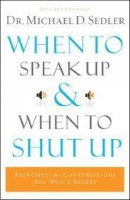 When to Speak Up and When to Shut Up: Principles for Conversations You Won't Regret by Michael D. Sedler (Chosen Books, 2003)
When to Speak Up and When to Shut Up: Principles for Conversations You Won't Regret by Michael D. Sedler (Chosen Books, 2003)
I jumped at the opportunity to review this book, because conversations are often difficult for me. As an introvert, I generally find conversations mentally and emotionally taxing, and thus tend to avoid them in situations where others might seek them out, such as with strangers on an airplane, or in those awkward "get to know each other" social gatherings. Over the years, I have attempted to improve my skills in this area, with the result that I'm now much more likely to initiate and contribute to conversations. Perhaps too likely. Once started, I can be hard to stop. I talk too much, running roughshod over others.
Hence my enthusiasm for reading this book. I was looking for help in achieving the proper balance, that is, when to speak up, and when to shut up.
Unfortunately, the book does not deliver what I was expecting. It is not so much about conversation as about confrontation: the times you should speak your mind, the times you should hold your tongue, and how to tell the difference between the two. (More)
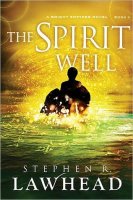 The Spirit Well by Stephen R. Lawhead (Thomas Nelson, 2012)
The Spirit Well by Stephen R. Lawhead (Thomas Nelson, 2012)
I am now totally hooked on Lawhead's Bright Empires series, and the next book isn't due out until September of this year. Keeping track of the action is a challenge, as the story jumps through multiple generations, eras, and places, but such dislocations are no more than the protagonists are expected to endure, and by this third book I've become an experienced traveller. Roller coasters can be great fun if you don't expect your equilibrium to remain unchallenged. (For one as face-blind as I am, it's actually easier than watching an ordinary movie.)
It's risky to praise a series from the middle—I thought Harry Potter had great potential, but grew more and more disappointed after the third book. So far, however, Bright Empires just gets better and better. This is probably because I like characters and mystery more than action, and this volume has a better thought-to-violence ratio than The Skin Map and The Bone House.
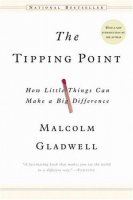 The Tipping Point: How Little Things Can Make a Big Difference by Malcolm Gladwell (Little, Brown, and Company, 2000)
The Tipping Point: How Little Things Can Make a Big Difference by Malcolm Gladwell (Little, Brown, and Company, 2000)
I’ve enjoyed some of Malcolm Gladwell’s other books (Blink, and Outliers), and heard a lot about The Tipping Point, so I expected to like this one better than I did. Certainly the story of how New York City cleaned up its subways and lowered its crime rate is encouraging, and well worth the whole book. Mostly I found it terribly depressing, however. As with the Heaths’ Switch and Made to Stick, I really don’t like learning that so many people in positions of trust are using every trick in the book and then some to manipulate us. Worse, these authors seem less concerned with arming the public against such efforts and more with teaching the tricks to those with “good” motives. But I say, if it’s wrong to manipulate a child to beg his parents for a toy, it’s still wrong to manipulate him to learn the alphabet. And what you learn about Sesame Street and Blue’s Clues from Tipping Point is not going to make you happy about plunking your child in front of the television, for all Gladwell’s approbations.
Even more depressing is the book’s description of fashion, style, what’s “cool” and how it gets that way. By contrast, Calvin’s views on Total Depravity are light and optimisitic.
Worst of all is the section on teen smoking, and other places where Gladwell reveals just how low his expectations are of teens, and how little he thinks parents can influence their children. It’s peers that matter, and if you move into a bad neighborhood, or adopt troubled children, expecting that your family strength, love, and high values will protect your children from the negative influences of their environment, you are tragically mistaken. A child is much better off in a bad family in a good neighborhood than the other way around. It’s normal, and even right, for teens to admire troublemakers, reject anything suggested by an adult, and seek out stupid, life-threatening, risks. There may be something to what he says—certainly no one should enter naïvely into a dangerous ministry—but such a hopeless, dystopian view is more than I can take, at least in my current fighting-the-remnants-of-the-flu state. For a reality check, I stop and look at our wonderful nephews, and remember my own life, where it was God’s grace through my family and nothing else that saved me from getting into a lot of trouble in the 1960’s.
Depressing as much of it may be, The Tipping Point does have some interesting ideas. One section I particularly enjoyed was “The Law of the Few,” in which Gladwell explains the unexpectedly great influence held by a few people, and not because they are rich or obviously powerful. Those he calls Connectors, for example, are far above average in the number and variety of people they know. They have mastered the art of the “weak connection,” a relation greater than mere acquaintance but far less than true friendship, and maintain this connection with a long list of folks from elementary school friends to college buddies, from fellow summer campers to people met on an airplane flight, from work colleagues to the people who mow their lawns. These “weak” connections are actually very powerful, because breakthroughs in our lives often come, not from our own circle of friends, but from those whose knowledge and resources are not so similar to our own.
The Tipping Point was written in 2000; I’d love to see an update, because with all his analysis of connectedness, information, and influence, leaving out social media and the Internet is a glaring, even incomprehensible, omission in 2013.
 Hannah Coulter by Wendell Berry; audiobook published by christianaudio Fiction and narrated by Susan Denaker
Hannah Coulter by Wendell Berry; audiobook published by christianaudio Fiction and narrated by Susan Denaker
With Hannah Coulter, Wendell Berry has half made me want to live in Kentucky, which—all my Kentucky ancestors notwithstanding—was not even on my places-to-visit list. Susan Denaker doesn't so much narrate the book as become Hannah Coulter, telling the story of the people of rural Kentucky, who "keep on living" through the sorrows and changes brought by the 20th century. I found it spell-binding.
Denaker's skill, I think, helps save Berry from the hubris of writing a first-person narrative as a woman. He mostly succeeds, though there are places—most obvious when Hannah is talking about her children, or sex—when the point-of-view comes across more like a man trying to think like a woman and not quite getting it.
There is beauty here, and sorrow, and strength, along with places where I wished I could argue with Hannah: it might be a good choice for a book club, because there are several interesting discussion points.
I'd heard about Wendell Berry, but this was for me the first of his novels. There are several more about the fictional town of Port William, Kentucky that will probably be worth reading eventually.
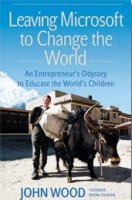 Leaving Microsoft to Change the World: An Entrepreneur's Odyssey to Educate the World's Children by John Wood (Collins, 2006)
Leaving Microsoft to Change the World: An Entrepreneur's Odyssey to Educate the World's Children by John Wood (Collins, 2006)
I don't believe one gets closer to God simply by climbing physically higher, but there must be something special in the rarefied air of the Himalayas. Greg Mortenson returns from a climbing expedition inspired to build schools for isolated, impoverished communities in Central Asia; John Wood visits Nepal, then quits his high-level, very highly paid job at Microsoft, and begins building libraries for poor children all over the world.
The organization Wood founded, Room to Read, has earned the highest Charity Navigator rating of four stars. That it has grown explosively and yet responsibly is as much a tribute to Wood's business accumen as to his good heart. His years at Microsoft were preparation for his life's mission, though he didn't know it at the time.
As for the book, it's fascinating to read, as much for the insights into Microsoft as for the larger story. There is, perhaps, a bit too much of Wood himself. I find him, like Mortenson, to be rather too much full of himself. John Wood does not seem like a pleasant person to live or to work with. I was particularly bothered by his abrupt decision to drop all previous commitments to get on with his mission. He broke up with his girlfriend, whom he supposedly loved, and with whom he was apparently serious enough not only to live with but to follow when her job moved her to China. He made (as far as I could see) no attempt to work things out, to give her time to adjust to the radical idea and catch his vision—just "my way or the highway" (never mind that his way was the highway). He quit his job abruptly, leaving his boss and coworkers in the lurch, not giving his employer a reasonable amount of time to find a replacement and make a smooth transition—just "Goodbye."
But one does not have to be good in all aspects of life to accomplish good things, even great things. And it may be said that full-of-yourself, aggressive personalities are much better at getting certain types of things done. Wood (and Mortenson, recent problems notwithstanding) certainly have done and are doing amazing work. Leaving Microsoft to Change the World is a great testimony to how important to a community it is to include members with different strengths and different personalities, even personalities we dislike. Even more, it's a brilliant example of what can be accomplished—beginning with a single, inspired, hardworking, driven individual—when great vision and solid business sense come together.
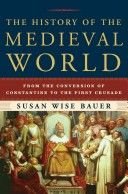 The History of the Medieval World: From the Conversion of Constantine to the First Crusade by Susan Wise Bauer (W. W. Norton, 2010)
The History of the Medieval World: From the Conversion of Constantine to the First Crusade by Susan Wise Bauer (W. W. Norton, 2010)
I am now caught up with Bauer's history series, at least until The History of the Renaissance World becomes available later this year. The History of the Medieval World is as good as the first book, The History of the Ancient World, though I will admit to some disappointment, as I was hoping for a little less of the "kings and battles and political intrigue" factor and more about art, music, and everyday life. But alas, the former provide the background on which the rest of life is played out—and the book is 667 pages long as it is. I'll have to be content with building up my times-people-places framework, and look elsewhere for the rest of the story.
Although the history of China, Japan, India, the Americas, and a few other parts of the world are important, it's harder for my euro-centric brain to keep the names straight, so my knowledge of those areas is still weaker. Not that it's easy with Europe: Just because "Charles" fits better into my memory than "Suryawarman," that doesn't mean keeping all those Germanic kingdoms straight isn't mind-boggling. I can't even manage the Wars of the Roses yet.
The sections on European history were the most interesting to me for a different reason: Having genealogy as a hobby means that many of the names are familiar. Recognizing Henry the Fowler as my 34th great-grandfather, for example, lends an unusually piquant flavor to the story.
I Like Birds is a video story created by my cousin, D.B. McLaughlin. The words, music, and photos are all his.
Think of this video as a children's book, read on a tablet by a caring adult to someone who is hungry to know more about their world. Pause the video or mute the music as you wish.
I hate to think of tablets replacing printed books, but that being said, this is great. Perhaps some of his first cousins once removed would enjoy it. (Update: I see I wrote "once removed"; I had meant to say "twice removed," but no doubt the parents will enjoy it, too!)
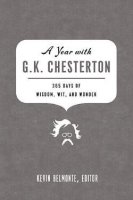 A Year with G.K. Chesterton: 365 Days of Wisdom, Wit, and Wonder editd by Kevin Belmonte (Thomas Nelson, 2012)
A Year with G.K. Chesterton: 365 Days of Wisdom, Wit, and Wonder editd by Kevin Belmonte (Thomas Nelson, 2012)
How can you go wrong with Chesterton? How could I pass up the opportunity to receive a free copy of this collection of a year's worth of his wisdom? So I didn't, despite my complaints about overflowing bookshelves and not enough time to read.
Since I had an obligation to review the book for its publisher, I couldn't really spread the readings out over 365 days—not that I would have exercised that much self-control anyway. Still, it was a delight, mostly. The selections themselves are fully delightful, mostly unknown to me, and interspersed with quotations from the Bible and quotations about Chesterton. My only quarrel with the book is the lack of sources. Who can read a good quotation and not want to see it in context? Many times Belmonte tells us the origins of a particular selection, but as many times he does not, which I found very frustrating.
Google came to the rescue. Many of Chesterton's writings are in the public domain and available online. This made finding the context of most of the passages easy, and should have saved much time in providing samples for this review, since all I had to do was copy them. Alas, I'm not sure that there was any savings at all, since finding the context inevitably meant I spent more time reading than I would have spent typing.
Be that as it may, here are a few treasures, mostly from the book, but some encountered through my online meanderings. Remembering the Golden Rule, I have provided the sources. (More)
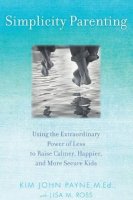 Simplicity Parenting: Using the Extraordinary Power of Less to Raise Calmer, Happier, and More Secure Kids by Kim John Payne with Lisa M. Ross (Ballantine Books, 2009)
Simplicity Parenting: Using the Extraordinary Power of Less to Raise Calmer, Happier, and More Secure Kids by Kim John Payne with Lisa M. Ross (Ballantine Books, 2009)
This review was interrupted so that I could write the Things Dr. Spock Won't Tell You post, simply so I could reference it here. When I get around to updating my list of favorite childrearing books, Simplicity Parenting will be there.
Insert here the usual disclaimer: I don't agree with all the author says. But there is so much of value here; I'd recommend it to all parents and parents-to-be. Grandparents, too, and even those without children in their lives. Because the book is as much about simplicity as it is about parenting.
I won't be able to do justice to the content of the book—and I sent it back to the library in part because I knew that if I had it I'd take too much time trying to do just that. But I'll attempt a one-line summary: There are incalculable advantages to a child's well-being to be found in simplicity, rhythm, and clutter-free living.
Most of the ideas in the book are not new to me. Perhaps one reason I like it so much is that it resonates well with theories I'd already encountered (and appreciated) over the last thirty-odd years. Simplicity Parenting connects the dots, and its strength lies in its comprehensiveness, its gentle encouragment, and above all in its practical suggestions. No matter how hurried, harried, stressed, and cluttered your world is, Kim John Payne convinces you that the benefits of simplicity are possible, taken in small steps and beginning exactly where you are. (More)
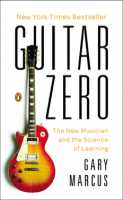 Guitar Zero: The Science of Becoming Musical at Any Age by Gary Marcus (Penguin Books, 2012)
Guitar Zero: The Science of Becoming Musical at Any Age by Gary Marcus (Penguin Books, 2012)
Hooray for our library for ordering this book after I requested it! Janet has written a great review already (which is why I wanted to read Guitar Zero in the first place), so this will be short. For what the book's really about, read what she has to say; I'll just mention a few of my impressions. I have 36 Post-It flags marking sections that especially interested me, but have neither time nor energy to type out more than a few.
Guitar Zero is a much better book than Kluge, also by Gary Marcus. A bit of the professional arrogance I talked about in my review of that book comes through here when he's talking about the brain, but it's much less, and I might not even have noticed it had I read this one first. Now I understand why Janet perceived him as very humble: His first serious attempts to tackle playing the guitar, at nearly 40 years old, with no musical background except listening, and the handicap of an extremely poor sense of rhythm, took place during a two-week stay at the family's summer cottage, where he practiced for several hours each day, for two weeks, where not only his wife but also his in-laws could hear every painful note of his miserable beginnings. To me, who with few exceptions won't sing or play a note unless I'm completely alone in the house, Marcus's behavior speaks of humility at a level I can't even imagine. He also makes no attempt to hide his musical ignorance, though his musical learning is very impressive.
It was fascinating, in reading, to learn just how vastly ignorant I am of the kind of music most people love and know best. I've kept myself consciously and deliberately ignorant of rock 'n' roll and its spawn, ever since my sixth-grade art teacher inflicted on us every day in class the music of an oddly-named British group called the Beatles. So it was with a kind of perverse delight that I read Marcus's careful, meticulous explanation of the parts of music I've known since elementary school while tossing around names of bands and singers and musical techniques with the assumption that of course they needed no explanation.
Just a few quotes:
By around six or seven months, infants start to become sensitive to the shapes of melodies. Given enough exposure, they can detect when a note has changed, recognize a short melody even when it has been transposed upward or downward in pitch, and sometimes remember melodies for weeks.
And maybe even younger. I think of two different instances I've read about: one where the sibling of a young Suzuki violin student clearly recognized, after birth, the Vivaldi concerto she had heard her brother practicing during the previous nine months; the other the newborn baby of a professional cellist, who responded similarly to the works her mother had practiced while pregnant.
The process of forming chords [on the guitar] is further complicated by the fact that one's fingers don't naturally move independently. (Try, for example, to bring all of your fingers together, with your palm facing down, and then slowly move your pinkie back and forth; your ring finger, and possibly your thumb, will be tempted to go along for the ride.)
I have no trouble doing this, but it's easier with my left hand than with my right, the legacy of my very-long-ago violin playing in school and some teenaged efforts on folk guitar. I never got above the barely-capable level of playing, but the circuits for the necessary independent finger movement are still imprinted on my brain.
Marcus spends a lot of time analyzing the differences and similarities between music and language. Most of it makes sense, but I do quarrel with some of his reasoning. He makes much of the fact that nearly every child learns to speak, and easily, whereas music is difficult to learn, not natural. My point is that children are naturally and constantly exposed to language from before birth, have great incentive to learn to talk, and are constantly encouraged in their efforts. What if they were similarly exposed and encouraged in music?
[Speaking of a master teacher] The single point that Michele was most adamant about was a rule for when parents should correct a child's mistake: never, ever until the child had made that error at least three times. [P]arents who corrected their children could easily wind up destroying their kids' motivation.
Many people probably imagine that kids are simply quicker learners, but laboratory research suggests otherwise. In the few direct comparisons of "procedural" learning in children and college-aged adults, adults actually tend to be quicker learners than children. ... If kids outshine adults, it's probably not because they are quicker to learn but simply because they are more persistent; the same drive that can lead them to watch the same episode of a TV show five days in a row without any signs of losing interest can lead a child who aspires to play an instrument to practice the same riff over and over again.
I figured out one of the reasons why music had always been such a struggle for me: rhythm turns out to be deeply tied to the balance-tracking vestibular system. Since I was a child, my vestibular system has been lousy. I could never bear to ride on a swing, despised being bounced up and down, routinely became nauseated when sitting in the back of the car, and opted out of roller coasters altogether. A new study showed that electrical stimulation of the vestibular system can directly affect rhythmic perceptions, and in retrospect it is easy to see why rhythm has always posed a challenge for me. It's a pretty safe bet that Jimi Hendrix enjoyed being bounced as a baby a lot more than I did.
Guitar Zero is almost enough to make me pick up an instrument again ... if only I could be humble enough to let someone hear me. And who am I kidding? Marcus proved (as John Holt did before him) that it's never too late to learn, what would I give up in order to find the hours and hours I'd need to practice?
Here are a few more quotes I pulled from Half the Sky before relinquishing it to the library.
Rape has become endemic in South Africa, so a medical technician named Sonette Ehlers developed a product that immediately grabbed national attention there. ... [The Rapex] resembles a tube, with barbs inside. The woman inserts it like a tampon, with an applicator, and any man who tries to rape the woman impales himself on the barbs and must go to to an emergency room to have the Rapex removed. When critics complained that it was a medieval punishment, Ehlers responded tersely: "A medieval device for a medieval deed."
There's a certain poetic justice in the device, for sure, though I believe the inventor is slandering the medieval era. One can only hope the women survive the mens' reactions. Though rape is famously the "fate worse than death," I'm not sure the victims in Darfur would agree.
In Darfur, after interviewing several women who told of having been raped when leaving their camps to get firewood, we asked the obvious question: "If women are raped when they get firewood, then why don't they stay in the camps? Why don't the men collect firewood?"
"When men leave the camp, they're shot dead," one of the women explained patiently. "When the women leave they're only raped." In almost every conflict, mortality is disporportionately male. Bult whereas men are the normal victims of war, women have become a weapon of war—meant to be disfigured or tortured to terrorize the rest of the population.
Alasdair Neale guest conductor
Sarah Chang, violin
Gioachino Rossini: Semiramide: Overture
Samuel Barber: Concerto for Violin, op. 14
Piotr Ilyich Tchaikovsky: Symphony No. 5 in E minor, op. 64
As much as I like music, it's not often a "happiness moment" coincides with a concert. (Mostly because the particular kind of happiness I'm documenting is rare.) But Sunday was a bright exception. I had been particularly looking forward to the afternoon concert, because we've loved Sarah Chang's violin playing since she was playing on a quarter-sized violin. But Ms. Chang's lovely performance was not the most memorable event of the concert.
Wow.
How often does the orchestra outshine the soloist?
We love the Barber Violin Concerto and we love Sarah Chang.
But hands down the best of the concert was the Tchaikovsky. Porter called it, "possibly the best I've ever heard the Orlando Philharmonic play." I don't care much for the modern habit of giving standing ovations so often that ordinary applause makes musicians think, "What did we do wrong?" But this one was truly well-deserved. The music came alive, it was meaningful, it was powerful—and what's more, it looked as if the musicians were enjoying themselves. This is hardly an obscure piece—and yet I can say that I've never heard a performance of Tchaikovsky 5 that moved me more.
Plus, it really helped that the concert was at 3 p.m. I'm far from my best and most appreciative when I'm struggling to stay awake. Not to mention the earlier time is safer for the drive home. :)


